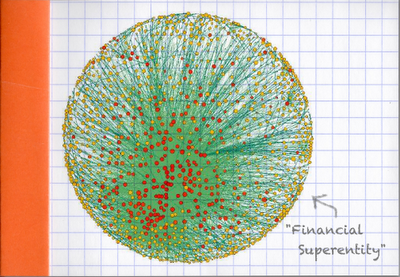Biz Stone's Blog
January 24, 2016
About Biz Stone
Biz Stone is an American entrepreneur known best as the co-founder of Twitter, Medium, and now Jelly Industries where he currently serves as CEO. A progenitor of social media, Stone has been developing large scale systems that facilitate the open exchange of information for more than fifteen years. Originally from Boston, Stone moved to California to work as an early Google employee. Stone is an active angel investor, board director, public speaker, and a prominent philanthropist
Biz has been honored with the International Center for Journalism Innovation Award, INC Magazine named him Entrepreneur of the Decade, TIME listed him as one of the 100 Most Influential People in the World, and GQ named him Nerd of the Year. In 2014, The Economist recognized Stone with their annual Innovation Award. In 2015, Stone’s Twitter won an Emmy and Biz received CIPR’s most prestigious accolade for his leadership at the forefront of developing new forms of media.
In addition to being a technologist, Biz is a Visiting Fellow at The University of Oxford, an Executive Fellow at Berkeley, a filmmaker, and an author. Stone’s recent book is titled, “Things A Little Bird Told Me.” It’s a humorous memoir in the business category. Having started out as an artist, Biz stresses creativity, learning from mistakes, and celebrating the triumph of humanity with a little help from technology. Stone lives near San Francisco with his wife Livia and son Jacob.
For press requests, please email press(at)jelly.co
Biz has been honored with the International Center for Journalism Innovation Award, INC Magazine named him Entrepreneur of the Decade, TIME listed him as one of the 100 Most Influential People in the World, and GQ named him Nerd of the Year. In 2014, The Economist recognized Stone with their annual Innovation Award. In 2015, Stone’s Twitter won an Emmy and Biz received CIPR’s most prestigious accolade for his leadership at the forefront of developing new forms of media.
In addition to being a technologist, Biz is a Visiting Fellow at The University of Oxford, an Executive Fellow at Berkeley, a filmmaker, and an author. Stone’s recent book is titled, “Things A Little Bird Told Me.” It’s a humorous memoir in the business category. Having started out as an artist, Biz stresses creativity, learning from mistakes, and celebrating the triumph of humanity with a little help from technology. Stone lives near San Francisco with his wife Livia and son Jacob.
For press requests, please email press(at)jelly.co
Published on January 24, 2016 13:36
April 13, 2015
Biz Stone, Super Co-Founder and CEO
 Super—Show The World How You Really FeelThat's my new gig. I teamed up with my friend Ben Finkel to co-found Super—a bold new way to share opinions with friends, both old and new. Here's how it works. Choose a “starter,” add your own words, and then pick an image from your camera or our magic suggestions—that combination is a fun surprise. Oh, and you can share to Twitter, Tumblr, Instagram, Facebook, the Web, etc..
Super—Show The World How You Really FeelThat's my new gig. I teamed up with my friend Ben Finkel to co-found Super—a bold new way to share opinions with friends, both old and new. Here's how it works. Choose a “starter,” add your own words, and then pick an image from your camera or our magic suggestions—that combination is a fun surprise. Oh, and you can share to Twitter, Tumblr, Instagram, Facebook, the Web, etc..The right composition of images and text can convey more emotion than either images or text alone. Super uses “starters”—like MY FAVORITE or DID YOU KNOW—along with suggested images to make posting in the community fun. It's a new and unique way to connect with people on a deeper level. Right now, it's just for iPhone and Android but we just got started so, more to come!




Published on April 13, 2015 12:02
May 21, 2013
My New Thing: Jelly
 I'm now Co-founder and CEO of Jelly Industries, Inc. A small startup based in San Francisco, California. We've not yet announced what our product will be but if you're interested in following along, feel free to visit our official blog, Jelly HQ.
I'm now Co-founder and CEO of Jelly Industries, Inc. A small startup based in San Francisco, California. We've not yet announced what our product will be but if you're interested in following along, feel free to visit our official blog, Jelly HQ.
Published on May 21, 2013 08:54
October 1, 2011
Behold, The Financial Superentity
 Economic literature often depicts markets as so dynamic that they are absent hot spots of control. Nevertheless, people have always suspected that a disproportionate amount of the world's economy is controlled by a small number of individuals. As it turns out, there is new and for the first time, empirical evidence to back up our anecdotal conspiracy theories. Thanks to the Cornell University Library, you can see
The Network of Global Corporate Control
.
Economic literature often depicts markets as so dynamic that they are absent hot spots of control. Nevertheless, people have always suspected that a disproportionate amount of the world's economy is controlled by a small number of individuals. As it turns out, there is new and for the first time, empirical evidence to back up our anecdotal conspiracy theories. Thanks to the Cornell University Library, you can see
The Network of Global Corporate Control
.Looking at a network of key financial actors within transnational companies, Stefania Vitali, James Glattfelder, and Stefano Battiston sorted through more than a million ownership ties to reveal a financial superentity. The diagrammed relationships show that in 2007, 147 companies controlled 40 percent of the world's global monetary value. The disproportionate ownership and close interconnectedness of so few financial titans appears, on its face, frightening.
In fact, like a common cold in kindergarten class, it seems fairly certain that if one of these players catches a virus then all of them will fall ill. However, the more optimistic flip side may also be true. The existence of this transnational superentity of immense economic value means global level change is achievable with only a small number of players. It's conceivable that seemingly impossible problems like climate change are addressable given these new facts.
While a virus might decimate the superentity, positive behavior and meaningful alignment is also more easily distributed via its interconnectedness. Today's New York Times features an article about our forests and our climate in peril. A group that controls 40 percent of global wealth could agree to a set of measures that would positively impact climate change. The only piece missing is to introduce these folks to each other. A social network might do the trick.
Published on October 01, 2011 15:11
September 25, 2011
The Power of Joining Forces
 Scientists who specialize in abiogenesis study how life arises from inorganic matter. These folks who study the origin of life will tell you that the "building blocks of life" are amino acids. What's amazing is that amino acids can form through natural chemical reactions that are unrelated to life. Amino acids organize into proteins which are essential to all living organisms. To put things very simply, life itself arises through the very basic act of joining forces.
Scientists who specialize in abiogenesis study how life arises from inorganic matter. These folks who study the origin of life will tell you that the "building blocks of life" are amino acids. What's amazing is that amino acids can form through natural chemical reactions that are unrelated to life. Amino acids organize into proteins which are essential to all living organisms. To put things very simply, life itself arises through the very basic act of joining forces.The power of joining forces is on display when we examine the differences between single cell organisms and multicellular organisms. Multicellular organisms are larger in size so they are safer from predators. Differentiation of cells within the population of a multicellular organism increases its chances for survival. Another advantage of being more than just single-celled is that networks can form, complexity is permitted, and cool things happen.
When I worked alone in Boston, I was like a single cell. Jason and Evan were thousands of miles away in San Francisco. We joined forces to work on Blogger at Google—the multicellular adventure had begun. When we worked with Jack Dorsey and others, the organism grew more complex and cool things happened. Twitter was a cool thing. Twitter allows people all over the world to join forces and make amazing things happen.
A new study from the University of Washington puts forward that Twitter played a central role leading to the successful overthrow of oppressive dictators in Tunisia and Egypt. Make no mistake, people are the driving force behind positive change. However, when we work together to build tools and give them to people, then it becomes possible to positively impact millions of lives. Technology that helps people work together is the most powerful kind.
For a company called Obvious, we are admittedly enigmatic—lots of great stuff is happening but it's not easy to discern. Maybe Obvious is just a multicellular organism bent on making big ideas happen by whatever means necessary. Ev recently wrote, "We write code and write checks, make calls and make coffee, push paper and pull strings. We bring people together and help them do more than they thought possible." I'm glad we joined forces.
Maybe you're a single cell right now. If you are, you should seriously consider expanding your operation. Life is a wondrous thing and it came about because of joining forces. Twitter came about in the same way and it's being used to make even better things happen. If you can't find someone to join forces with, then join us. We've already got a pretty awesome multicellular operation going and we're interested in growing even more.
Published on September 25, 2011 21:52
September 5, 2011
Cultural Neuroscience and Startups
 Henry David Thoreau said, "As a single footstep will not make a path on the earth, so a single thought will not make a pathway in the mind. To make a deep physical path, we walk again and again. To make a deep mental path, we must think over and over the kind of thoughts we wish to dominate our lives." The emerging interdisciplinary field of cultural neuroscience deals with daily social realities and how they can affect individual members of a culture—perhaps a startup culture.
Henry David Thoreau said, "As a single footstep will not make a path on the earth, so a single thought will not make a pathway in the mind. To make a deep physical path, we walk again and again. To make a deep mental path, we must think over and over the kind of thoughts we wish to dominate our lives." The emerging interdisciplinary field of cultural neuroscience deals with daily social realities and how they can affect individual members of a culture—perhaps a startup culture.At a recent World Congress on Positive Psychology Dr Richard J. Davidson from the University of Wisconsin-Madison shared research into the positive benefits of compassion and his work reminded me of the startup culture I'm so keen to encourage. Dr. Davidson effectively showed that mindfulness and compassion can enhance the prefrontal cortex—an area of our brain that helps us determine good from bad, controls our personality, and guides us toward our goals.
Previous research published in the Journal of Cognitive Neuroscience showed devastatingly negative results both in the brain and even on organs when stressors are given to produce anxiety. So, if you work with people who are stressing you out or making you anxious then you may be hurting yourself mentally and physically. Ideally, you should work in an environment with compassion, mindfulness, respect, and good, healthy debate when it's needed.
Companies can be a vehicle for positive individual transformation. Startups have a unique ability to create a culture of compassion that helps us improve and in so doing, we are more likely to make a difference in the lives of others. It's possible to build a business, help people, and enjoy our work. How we approach our work is often as important as the work itself because the way we treat each other, our shared environment, and the way we cooperate shapes us as people.
Whatever your role is at the company you work for—whether you're an executive with many reports, or an individual contributor on a team, practicing regular, daily mindfulness and compassion will make you a healthier, more productive person. Additionally, the people you work with are going to respond better and do better work. The outcome is going to be a superior product or service, a happier user or client, and in the best case—a positive global impact.
Published on September 05, 2011 15:34
August 14, 2011
On Rats, Sleep, and Startups
 Art by Matty M. Cipov (purchased on Etsy)
Art by Matty M. Cipov (purchased on Etsy)The archetypal startup mentality is working grueling hours deep into the night and through the weekend to achieve extraordinary goals. However, there is some science to suggest that working without the proper rest leads to more errors. These errors could lead to shoddy work requiring even more effort and expense to fix later. I'd also add that this approach lowers morale.
A fundamental principle of sleep science says the brain is either awake or asleep. However, new studies show that when individuals are deprived of sleep, some neurons will quit and take a nap. Researchers at the University of Wisconsin-Madison studied the cerebral cortices of rats and recorded their brain activity by electroencephalography for several weeks.
Rats are sophisticated and noble mammals, so comparing them to startup developers should in no way be construed as anything but a compliment. Anywhoo, this research team discovered that for normal hours of activity, cortical neurons were firing as expected during wakefulness. Likewise, when sleeping, brain activity showed the characteristic patterns of deep sleep.
However, when the little guys were kept up past their bedtime, stimulated by a miscellany of interesting new toys, cortical neurons began shutting down. Although fully awake according to the electroencephalography patterns, the rats made ever more errors in simple tasks designed to release a treat upon completion. They were practically zombie rats!
Why different parts of the brain would shut down in waking individuals is unclear. Maybe it's part of some overall grey matter energy saving protocol. Or, it could be the manifestation of a brain operating at potentially unhealthy if not dangerous degrees of fatigue. Forcing people to work without proper rest is likely impractical and may even be punishing.
In my experience, it's far more motivating to be part of a team that has an appropriate work life balance including the right amount of rest. People are more creative, more efficient, and generally more fun to be around when they're not sleep-deprived zombies. So, my advice is to work effectively and get your rest. Also, in my opinion, you're doing a great job.
Published on August 14, 2011 09:22
August 13, 2011
Honeybees and Investors
 Between Jason Goldman's macroeconomic neuroses by day, and Livia's naturalist fascinations pervading our dinnertime conversation, my mind becomes jumbled with combinations. It's surprising how many similarities tend to emerge. Often I've thought to write about these interesting mashups, so here is an example involving honeybees and investors.
Between Jason Goldman's macroeconomic neuroses by day, and Livia's naturalist fascinations pervading our dinnertime conversation, my mind becomes jumbled with combinations. It's surprising how many similarities tend to emerge. Often I've thought to write about these interesting mashups, so here is an example involving honeybees and investors.Lately, Jason has been cautioning me about flight-to-quality—a financial market phenomenon set off by a surprise unsettling event or series of events. The ensuing financial tumult causes a sudden shift in behavior by investors whereby they seek to sell assets thought of as risky in favor of purchasing traditionally trusted, safe assets they understand better.
Pessimistic thinking, or a belief that the worst will happen, is apparently not unique to financial markets. In fact, it's possibly a universal adaptation advocating prudence when confronting the unfamiliar in turbulent times. Behavioral scientists at Newcastle University in England have recently shown that among other animals, honeybees become pessimistic when stressed.
The scientists trained bees with two odors. One odor always lead to sugar, the other always lead to bitter quinine. Having learned the association between odor and taste, the bees regularly attended the sugar. Next, the researchers vigorously agitated half the bees as if their hive were under attack and left the other half alone. Turbulent times, indeed!
Within five minutes, the research team exposed both groups to the familiar two smells as well as three new smells. The bees from the continuously calm group willingly investigated these new smells to see if there was anything potentially interesting—more sugar, perhaps. However, bees from the shaken group refused all new smells in favor of the one guaranteeing sugar.
It seems that whether we are human, dog, rat, bird, or bee, we are capable of pessimistic cognitive biases especially after stressful situations. These bees seemingly reacted the same way investors might after being shaken by some disturbing event. In summary, by listening to Jason and Livia, I am becoming an amateur, cross-species, evolutionary psychologist.
Published on August 13, 2011 14:58
June 28, 2011
It's So Obvious
 Believe it or not, Jason is the smartest of the trio.
Believe it or not, Jason is the smartest of the trio.My career in developing large scale systems that allow people to express themselves and communicate started in 1999 with Xanga. I left after a couple years and got more academic about the democratization of information on the web. Ironically, I wrote two books about blogging. In 2002, I tried to start a microblogging service but have you heard of Sideblogger? Didn't think so.
When I joined the Blogger team at Google in 2003, my new environment had everything I could possibly want and so much more. It turns out that I would start working with a couple guys who would end up close friends and lifelong collaborators—Evan Williams and Jason Goldman. In 2005, I learned to my surprise that working with Ev was more important than staying at Google.
Ev left Google and I followed him shortly thereafter. I helped him with a startup that didn't quite work out. We tried to sell it, but no luck. To save the day, Ev generously created Obvious—a company to buy this failure back from the investors with his own money. Jason Goldman joined us and the idea was that we could live our dream—developing multiple projects under one company with nobody to answer to but ourselves.
The assets of Ev's freshly acquired failure included Twitter—a project I had put much effort into with Jack Dorsey and others. It was something we were endlessly ridiculed for as being "useless" but we believed in it and Evan believed in us so he kept funding us until Twitter started spreading like wildfire. In 2007 Jack, Ev, and myself founded Twitter, Inc with outside capital.
Although it was incubated for about half a year at Obvious, Twitter was now it's own fast growing company and it demand all of our attention. The company Ev had created started a couple projects but ultimately faded out of the picture. So, for more than 5 years our attention was focused on Twitter as it grew from a "useless" toy to a particularly informative global phenomenon with amazing potential.
The Dream Lives
My work on Twitter has spanned more than half a decade and I will continue to work with the company for many years to come. During this time—especially lately, it has come to my attention that the Twitter crew and its leadership team have grown incredibly productive. I've decided that the most effective use of my time is to get out of the way until I'm called upon to be of some specific use.
Twitter CEO Dick Costolo has been very supportive in thinking this through with me so I can focus on new endeavors while remaining a strategic asset to Twitter. My plan is to take a bit more time to focus on helping schools, nonprofits, and company advisory boards as well as The Biz and Livia Stone Foundation. I'll still commit part of my time to hands on help with Twitter wherever and whenever I can be of assistance.
As for the bulk of my time day-to-day, I'm thrilled to announce that Evan Williams, Jason Goldman and myself will be relaunching The Obvious Corporation as co-founders. Our plan is to develop new projects and work on solving big problems aligned along a simple mission statement: The Obvious Corporation develops systems that help people work together to improve the world. This is a dream come true!
Published on June 28, 2011 11:43
April 14, 2011
The Trouble Bubble
 We founded Twitter, Inc. in March of 2007 and while we have long said it's about the users, not the service, we have nevertheless enjoyed favorable media coverage. What took so long for somebody to write the article that says we are falling apart? The normal press cycle is to put a company on a pedestal and then knock it down. It's much more interesting that way. Twitter has had so many ups and downs you'd think we would have had more negative press. To me, it's like watching the movie Rocky—he's up, he's down, he's out, he wins!
We founded Twitter, Inc. in March of 2007 and while we have long said it's about the users, not the service, we have nevertheless enjoyed favorable media coverage. What took so long for somebody to write the article that says we are falling apart? The normal press cycle is to put a company on a pedestal and then knock it down. It's much more interesting that way. Twitter has had so many ups and downs you'd think we would have had more negative press. To me, it's like watching the movie Rocky—he's up, he's down, he's out, he wins!Fortune magazine finally stepped up to knock us down with a cover article, "Trouble@Twitter." Here are some examples of how this works. After mostly positive coverage of Facebook, Fortune finally published an article in April of 2009 titled, "Is Facebook Losing Its Glow?" However, later that year they published, "What Backlash? Facebook Is Growing Like Mad." Google received similar treatment. In July 2010 Fortune published, "Google, The Search Party Is Over." Later that year, they published, "Google Continues To Gain Search Marketshare."
We've had lots of positive press from Fortune in the past. In July of 2010 they published an article titled, "Twitter's Business Model: A Visionary Experiment." The article ended with, "Facebook might want to take notes." It may seem odd, but from my perspective, this means we are being taken very seriously. Twitter is an important company and it's under scrutiny from journalists—this is exactly how it's supposed to work. Now it's our job to prove the reporters wrong so they can write an article later about how we have made dramatic progress.
The Twitter team is an incredibly dedicated group of people who truly believe they are doing the most meaningful work of their lives. It's also a very small group of people when compared to the other companies Fortune is investigating. We still have under 500 employees—many of them working weekends and nights to fulfill a potential that is palpable. For a long time, we refused to hire a communications group and now that we have one, I'm having fun teasing them about this Fortune article but the truth is, we're long overdue to be knocked down by the press.
Published on April 14, 2011 22:43
Biz Stone's Blog
- Biz Stone's profile
- 37 followers
Biz Stone isn't a Goodreads Author
(yet),
but they
do have a blog,
so here are some recent posts imported from
their feed.



